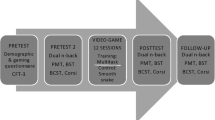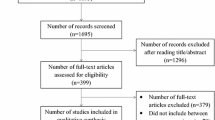Abstract
Purpose
The present study aimed to investigate the perceived importance of competencies related to entrepreneurship as starting point for a new career in European athletes.
Methods
A Focus Group Interview (FGI) within AtLETyC project (Erasmus+) was administered to 78 European athletes (i.e., 26 female: 27 ± 7 years; 52 male: 28 ± 9 years) related to six countries (i.e., Austria, Bosnia and Herzegovina, Lithuania, Slovenia, Hungary, and Italy). Among 22 items of the FGI, 8 items were focused on general aspects, contact information, the evaluation of the educational background, the sport entrepreneurship expertise, and learning capacity, whereas the remaining 14 Likert scale (i.e., 1–7) items were specifically oriented to determine the perceived importance of entrepreneurship-related competences. For the latter part of the FGI, not-parametric analyses (i.e., Kruskal–Wallis, Mann–Whitney U) were applied.
Results
Results showed that all athletes highly consider the importance of both general and entrepreneurship-related competencies, excepting for the latter items in Slovenian athletes. However, main effects between athletes of different countries emerged in 12 of the 14 items, with the highest mean values (6.0–7.0) reported from Bosnia and Herzegovina athletes and the lowest ones (range 3.6–4.8) from Slovenian counterpart.
Conclusion
Although a cross-national scenario in relation to the perceived importance of sport entrepreneurship competences seems to be influenced by different institutional supports for dual career, general results showed that European athletes highly perceived the importance of such competences, confirming the substantial necessity to apply the AtLETyC action.
Similar content being viewed by others
References
Commission European (2007) Commission staff document: action plan ‘Pierre de Coubertin’, accompanying document to the white paper on sport. Directorate-General Education and Culture, Brussels
Alfermann D, Stambulova NB (2000) Career transitions and career termination. In: Tenenbaum G, Eklund RC (eds) Handbook of sport psychology. Wiley, New York, pp 712–736
Ericsson KA (2006) The influence of experience and deliberate practice on the development of superior expert performance. In: Hoffman RR, Ericsson KA, Charness N, Feltovich P (eds) Cambridge handbook of expertise and expert performance. University Press, Cambridge, pp 685–706. doi:10.1017/cbo9780511816796.038
Aquilina D (2013) A study of the relationship between elite athletes’ educational development and sporting performance. Int J Hist Sport 30(4):374–392. doi:10.1080/09523367.2013.765723
Conzelmann A, Nagel S (2003) Professional careers of the German Olympic athletes. Int Rev Sociol Sport 38(3):259–280. doi:10.1177/10126902030383001
Donnelly P, Petherick L (2004) Workers’ playtime? Child labour at the extremes of the sporting spectrum. Sport Soc 7(3):301–321. doi:10.1080/1743043042000291659
Wylleman P, Reints A (2010) A lifespan perspective on the career of talented and elite athletes: perspectives on high-intensity sports. Scand J Med Sci Sports 20(Suppl 2):88–94. doi:10.1111/j.1600-0838.2010.01194.x
European Commission (2007) White paper on sport. Directorate-General Education and Culture, Brussels
European Commission (2014) Report from the commission to the European Parliament, the Council, the European Economic and Social Committee and the Committee of the Regions on the implementation of the European Union Work Plan for Sport 2011–2014. http://eur-lex.europa.eu/legalcontent/EN/TXT/PDF/?uri=CELEX:52014DC0022&from=EN. Accessed 25 June 2016
European Commission (2014) Resolution of the Council and of the Representatives of the Governments of the Member States, meeting within the Council, of 21 May 2014 on the European Union Work Plan for Sport (2014–2017). http://eur-lex.europa.eu/legal-content/EN/TXT/PDF/uri=CELEX:42014Y0614(03)andfrom=EN. Accessed 25 June 2016
European Commission (2013) Call for Proposals—Erasmus+ programme. http://eur-lex.europa.eu/legal-content/EN/TXT/PDF/?uri=OJ:JOC_2013_362_R_NS0004&from=EN. Accessed 25 June 2016
European Commission (2012) Guidelines on dual-careers of athletes recommended policy actions in support of dual-careers in high-performance sport. http://ec.europa.eu/sport/news/20130123-eu-guidelines-dualcareers_en.htm. Accessed 25 June 2016
Stambulova N, Stephan Y, Jäphag U (2007) Athletic retirement: a cross-national comparison of elite French and Swedish athletes. Psychol Sport Exerc 8(1):101–118. doi:10.1016/j.psychsport.2006.05.002
Lupo C, Guidotti F, Goncalves CE, Moreira L, Topic MD, Bellardini H, Tonkonogi M, Colin A, Capranica L (2015) Motivation towards dual career of European student-athletes. Eur J Sport Sci 15(2):151–160. doi:10.1080/17461391.2014.940557
Guidotti F, Cortis C, Capranica L (2015) Dual career of European student-athletes: a systematic literature review. Kinesiol Slov 21(3):5
Capranica L, Guidotti F (2016) Research for cult committee qualifications/dual careers in sports. European Parliament: Directorate-General for internal policies. Policy Department. Structural and cohesion policies: cultural and education 2016. http://www.europarl.europa.eu/RegData/etudes/STUD/2016/573416/IPOL_STU(2016)573416_EN.pdf. Accessed 5 July 2016
Aquilina D, Henry I (2010) Elite athletes and university education in Europe: a review of policy and practice in higher education in the European Union Member States. Int J Sport Policy 2(1):25–47. doi:10.1080/19406941003634024
Henry I (2013) Athlete development, athlete rights and athlete welfare: a European Union perspective. Int J Hist Sport 30(4):356–373. doi:10.1080/09523367.2013.765721
Lupo C, Mosso CO, Guidotti F, Cugliari G, Pizzigalli L, Rainoldi A (2017) The adapted Italian version of the Baller identity measurement scale to evaluate the student-athletes’ identity in relation to gender, age, type of sport, and competition level. PLoS One 12(1):e0169278. doi:10.1371/journal.pone.0169278
European Commission (2017) Athletes learning entrepreneurship—a new type of dual career approach. http://ec.europa.eu/programmes/erasmus-plus/projects/eplus-project-details-page/?nodeRef=workspace://SpacesStore/816052a5-c304-4fdd-9196-777a1b748552. Accessed 5 Apr 2017
Su C-T, Parham LD (2002) Generating a valid questionnaire translation for cross-cultural use. Am J Occup Ther 56(5):581–585. doi:10.5014/ajot.56.5.581
Field A (2013) Discovering statistics using IBM SPSS statistics. SAGE Publications, Thousand Oaks
Huck SW (2000) Reading statistics and research. Addition-Wesly Longman, New York
Lupo C, Tessitore A, Capranica L, Rauter S (2012) Motivation for a dual-career: Italian and Slovenian student-athletes. Kinesiol Slov 18(3):47
Commission European (2011) Developing the European Dimension in Sport. Directorate-General Education and Culture, Brussels
Lupo C, Mosso CO, Guidotti F, Cugliari G, Pizzigalli L, Rainoldi A (2017) Motivation toward dual career of Italian student-athletes enrolled in different university paths. Sport Sci Health. doi:10.1007/s11332-016-0327-4
Capranica L, D’Artibale E, Cortis C, Tessitore A, Casella R, Pesce C, Camilleri E (2008) Italian women’s television coverage and audience during the 2004 Athens Olympic Games. Res Q Exerc Sport 79(1):101–115. doi:10.1080/02701367.2008.10599465
Guidotti F, Capranica L (2013) Management sportivo femminile e carriera universitaria nelle scienze motorie: la condizione attuale, le opinioni delle manager e delle docenti universitarie e le nuove proposte (Female sport management and academic career in sport sciences: present condition, women sport managers’ and university professors’ opinions and perspectives). Riv Trimest Sci dell’Amministrazione 1:85–104
Author information
Authors and Affiliations
Corresponding author
Ethics declarations
Conflict of interest
The authors declare that they have no conflict of interest.
Ethical approval
All procedures performed in studies involving human participants were in accordance with the ethical standards of the institutional and/or national research committee and with the 1964 Helsinki declaration and its later amendments or comparable ethical standards.
Informed consent
Informed consent was obtained from all individual participants included in the study.
Rights and permissions
About this article
Cite this article
Lupo, C., Brustio, P.R., Valentic, E. et al. The use of Focus Group Interviews to define the perceived importance of competencies related to the entrepreneurship as starting point for a new career in European athletes: an AtLETyC study. Sport Sci Health 14, 9–17 (2018). https://doi.org/10.1007/s11332-017-0385-2
Received:
Accepted:
Published:
Issue Date:
DOI: https://doi.org/10.1007/s11332-017-0385-2




